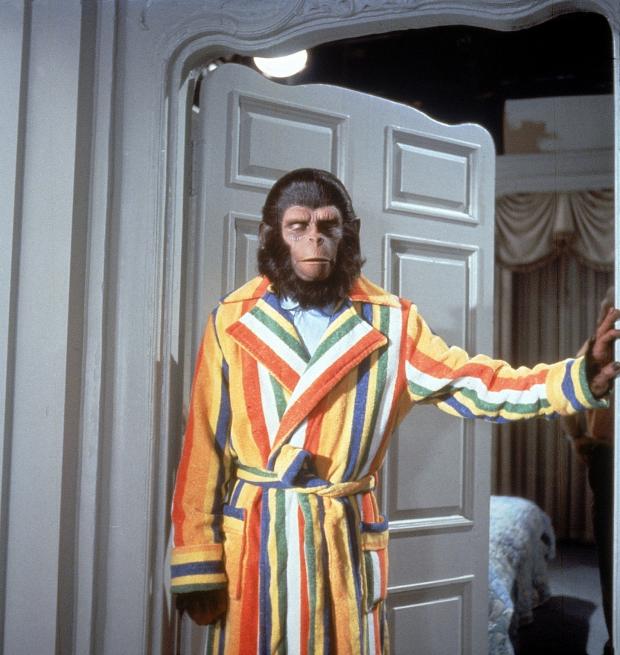 The third in the original five-film
Planet of the Apes story
arc, Escape from the Planet of the Apes sidesteps the end of
the world as it occurred in the last entry,
Beneath the Planet of
the Apes, by having three of the chimpanzees -- Zira (Hunter,
Midnight in the Garden of Good and Evil), Cornelius
(McDowall, Circle of Iron)
and Milo (Mineo, Rebel without a Cause) -- travel back in time using Taylor's spaceship to the early
1970s Earth. Humans greet them as visitors from outer space,
only to be shocked to discover they are talking apes who claim to be
from Earth's future. Initially embracing them, statements the
apes make raise red flags about whether they should be allowed to
live, should their descriptions of a humankind in bondage actually
come about.
The third in the original five-film
Planet of the Apes story
arc, Escape from the Planet of the Apes sidesteps the end of
the world as it occurred in the last entry,
Beneath the Planet of
the Apes, by having three of the chimpanzees -- Zira (Hunter,
Midnight in the Garden of Good and Evil), Cornelius
(McDowall, Circle of Iron)
and Milo (Mineo, Rebel without a Cause) -- travel back in time using Taylor's spaceship to the early
1970s Earth. Humans greet them as visitors from outer space,
only to be shocked to discover they are talking apes who claim to be
from Earth's future. Initially embracing them, statements the
apes make raise red flags about whether they should be allowed to
live, should their descriptions of a humankind in bondage actually
come about.
Bringing out more comedy than had been in evidence in the prior two
entries, Escape finally fully embraces the campy qualities
that had been the window dressing of its more serious predecessors,
only showing a straight face as it nears its finale. In a bit of
a role reversal, it feels like a negative image of the plot of the
original film, as now it is the apes' turn to find themselves
surrounded in the dangerous world of humans, who are the captors of
the simian lot, and their "fish out of water" antics provides a good
deal of the punch lines. Unlike the human astronauts in the
future, who are immediately enslaved before one of them earns the
apes' trust and is freed, in this one, the ape-stronauts (as they are
called by the media) are initially heralded and accepted, only to find
themselves more and more trapped and deemed a menace as the story
rolls on.
While the presence of Charlton Heston is missed, it's good to see
Roddy McDowall, who sat out the second installment (save for a
voiceover at the beginning), along with the lively presence of Kim
Hunter, reprising their roles as pacifist scientists, Kira and
Cornelius. Both actors imbue their characters with plenty of charisma
and decent comic timing, such as in scenes in which Kira imbibes
"grape juice plus" (aka wine), and can't seem to handle her buzz, or
when they don human garb for the first time in downtown Los Angeles.
Kira also gets to deliver a fiery speech to a group of women that
feels right out a women's lib playbook of the early 1970s era, though,
while an amusing scene, it feels wildly out of place for the character
who had never shown an inkling of resistance to the patriarchal
society of apes that takes place in the future (i.e., her past).
It's in this film that we're introduced to that ultimate time travel
conundrum of whether we can change our fate, and whether the act of
travel itself has already altered the course of the future history, or
if it becomes the direct cause of it. Certainly, the presence
of two talking chimpanzees who are 'mates' raises the possibility that
they could have a child chimp that's as smart as they are. Will
that be the start of the ape rise? And if so, how did it happen
the first time through the time loop when Zira and Cornelius's arrival
was the catalyst? Was it just Earth's destiny -- or God's plan,
as is talked about as a main theme within the dialogue?
Although it pales by comparison to the landmark 1968 original,
Escape is a refreshing change of pace for the first half, finally
running out of creative steam for its second, where it becomes a
prolonged, boring, and very predictable chase flick. The final
shot (and final line) of the film is one you can see coming long
before it occurs, and the way it is edited makes it feel cheap and
hurried. This last half of the film feels like it is padded for
time (along with its lengthy title sequence, it is barely 90 minutes
of story), to the point where it is only when the chase finally ends
that it begins to get interesting. The shoot-out in the climax
does take some unexpected turns, so I will give the filmmakers credit
for having the guts to go where it goes, but the deadly seriousness of
it does jar with the light and comic tone of nearly every scene
preceding it.
While it is a welcome direction for the franchise, and collects quite
a few funny or clever scenes, the fact that screenwriter Dehn (Goldfinger,
Murder on the Orient Express) has
delivered only half of a decent movie makes it fall just short of a
recommendation. Certainly, there's enough here for Apes
fans to find worthy of their continued attention, but those looking
for a return to the intelligence of the 1968 magnum opus will likely
find these sequels continue to deliver diminishing returns.
-- Followed by Conquest of the Planet of the Apes.

 The third in the original five-film
The third in the original five-film